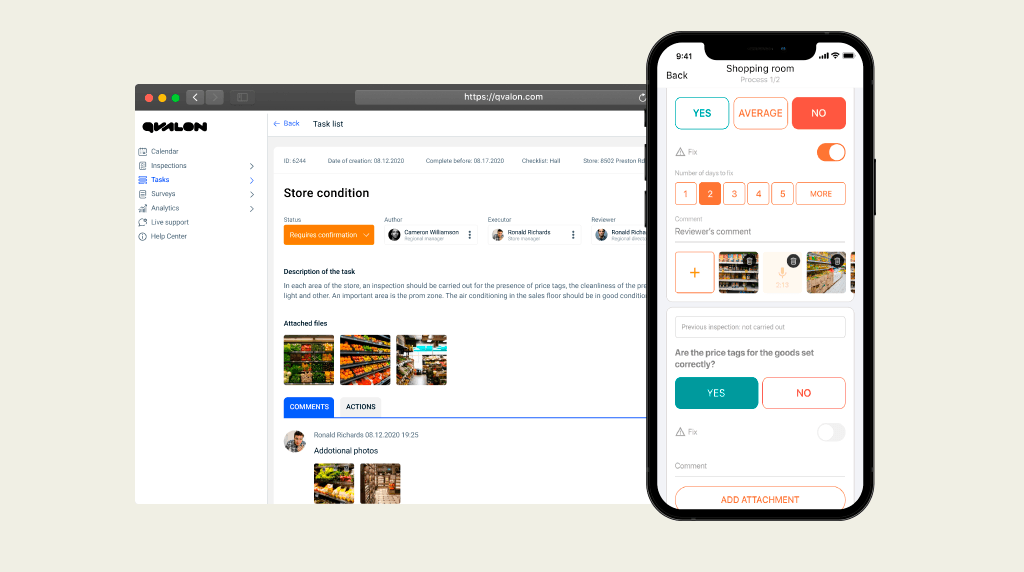Qvalon Blog article content
We are living in the age of personalization. From personalized travel plans that give you the option to schedule your whole itinerary as per your preferences, to personalized medicine that are attuned to the specifics of your DNA. Even on a regular day, when the cashier at the local coffee shop greets us using our name, it makes us feel special, and subconsciously, it is one of the reasons why we visit that cafe repeatedly.

So when on an individual level, we prefer things that are customized for us, then the same stands true for businesses. The benefits of checklists are now known to most companies. But what is not known to them is that generic checklists do not reflect the complete picture of a company. Template-based checklists that are specific to the needs of an industry genre, but not of an individual company leave enough untapped potential that it is necessary to reconsider the whole checklist approach.
Another example from our daily life is to understand this better. There is a business conference coming up and you need a suit. You can buy one off-the-rack from any store and participate in that conference, but are you comfortable in that suit? Do you look sharp wearing it or is it obvious that it is a miss? That suit is how generic checklists are. They are designed to fit the needs of many, not just yours. Hence, strong chance it will have to improve according to your personal needs.
How to implement ready-made checklist
We expect good results without due hard work. If a problem arises, our basic instinct is to look for solutions that are already available, rather than come up with a solution ourselves. Which is reasonable at times, considering our quick-paced lives.
The same approach goes for a company’s approach towards checklists. Depending upon the industry (clothing, food and beverages, hardware, etc.), readymade checklist templates are found, downloaded, and used. Judging by the number of free checklists available on the internet, all businesses should have improved long ago. But that is not the actual scenario.
At first glance, all the stores look similar. Each of them performs the same routine operations (e.g. opening/closing of a store) that can be monitored by using a standard checklist available for free. It would be something like this:
Standard store checklist
|
Facility |
Question |
Explanation |
|
Adjacent area |
Clean (YES / NO) |
There is no garbage, snow is removed in winter, approaches and entrances to the shop are obstruction free. |
|
Facade |
OK (YES / NO) |
No damage, no unauthorized inscriptions, ads. |
|
Signboard |
OK (YES / NO) |
At night the sign is illuminated, if technically possible, during the day the sign is switched off. |
|
Rubbish bins |
Clean (YES / NO) |
Clean outside, clear around the bins. |
|
Empty (YES / NO) |
Empty before opening; empty in the daytime — not more than 1/2 full; at rush hour — not more than 2/3 full. |
|
|
Vestibule |
Clean (YES / NO) |
No debris or other impurities, clean dirt-proof carpet at the entrance. |
|
Front doors |
OK (YES / NO) |
Doors are in good condition, open easily, clean. |
|
Bag closet |
OK (YES / NO) |
Drawers are clean inside, doors are in good condition, locks are in working condition, keys are available. |
It would appear to us that the above checklist is detailed enough to cover all aspects, so there should not be any problem. But not all questions would be relevant to a business. For example, the vestibule clause states that it is necessary to check the presence and cleanliness of the dirt-proof carpet. Now if a store is located in a shopping center, then it might not have a carpet or a vestibule. So this question will have to be excluded or modified.
For simple operations such as opening a store, generic checklists are enough. But if you try to use them for more complex business processes, you will find that it has to be modified and tailored so much, that a personalized checklist would have been a good option at the start. And this is only half of the picture. Once you've implemented a generic checklist, you soon learn that the results are not as accurate as expected.
Readymade checklists cause incorrect results
A frequent scenario is, you found a checklist for the layout of goods and decided to use it to evaluate your retail facilities. You collect the results and find that all the stores are displaying the goods incorrectly. Why? Most likely, there are two reasons:
-
The checklist you downloaded was compiled based on different standards (they could be for goods layout in the warehouse, not in a retail store).
-
The auditors did not have any explanation of the issues and samples of the correct layout.
Because of this, the checklist results will not correspond to real scenarios.
What is the right checklist?
The personalized checklist is the right checklist and in fact, a need for present-day business challenges. In a consumer-driven market, competition is stiffer. To succeed, you cannot rely solely on what others are doing. Be it providing a unique customer experience, or be it looking for solutions to organizational challenges, a personalized approach is a right approach.
In a best-case scenario, you can use checklist templates available on the internet only as a model to build your own. Ideally, you should personalize everything based on your company's standards. In other words, you need to have a clear understanding of how the business process should run, in accordance with your company standards and this understanding should reflect in the checklist questions.
It is also desirable that the preparation of checklist questions should involve those who actually execute the business processes. Otherwise, in practice, there will be persistent inconsistencies that will hamper and delay the work of all participants.

The efforts needed to create proficient and personalized checklists are covered in our other article “How to create checklists for the retail network that will work?“ QVALON provides quick and expert assistance to businesses to help them make effective and efficient checklists. And that is just one of the many features available.
At QVALON, our team delivers tailor-made, simple, and cost-effective solutions. Connect with us and understand how a new approach towards checklists can transform your business for the better.



